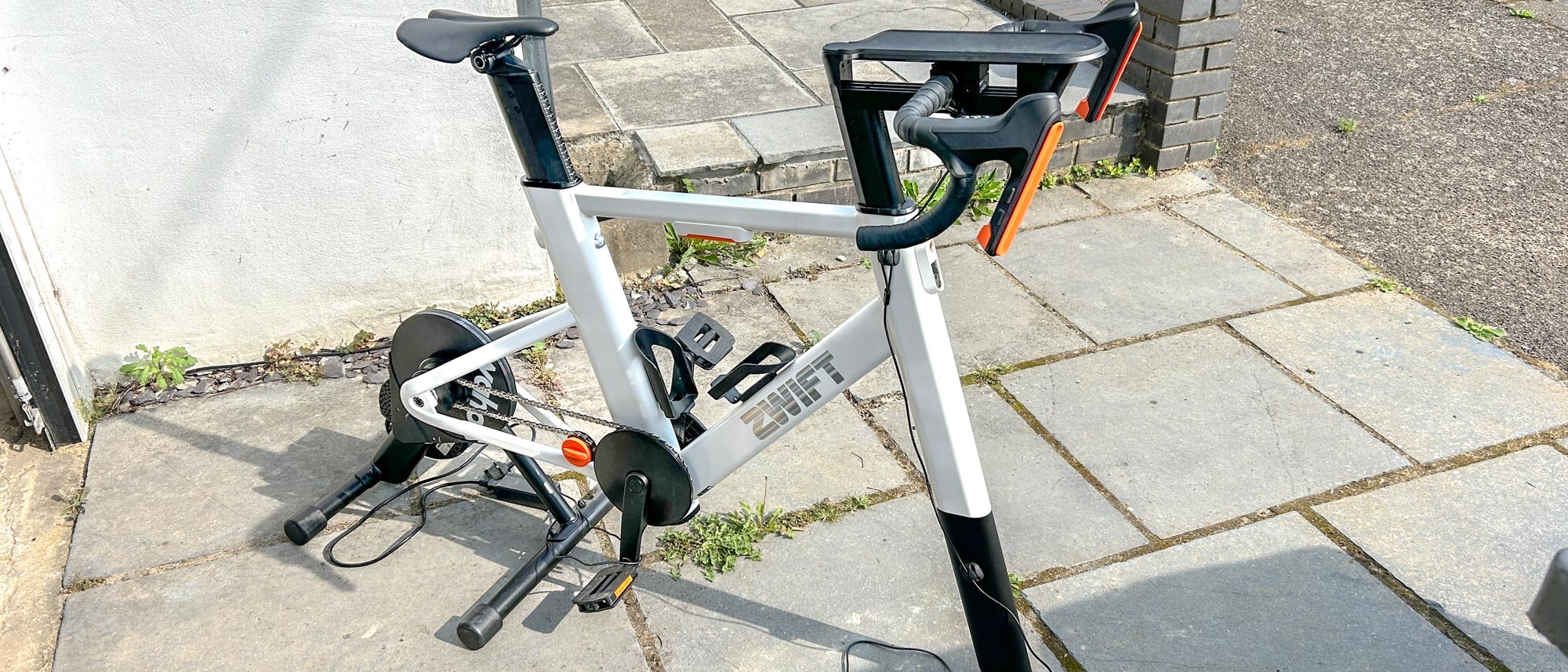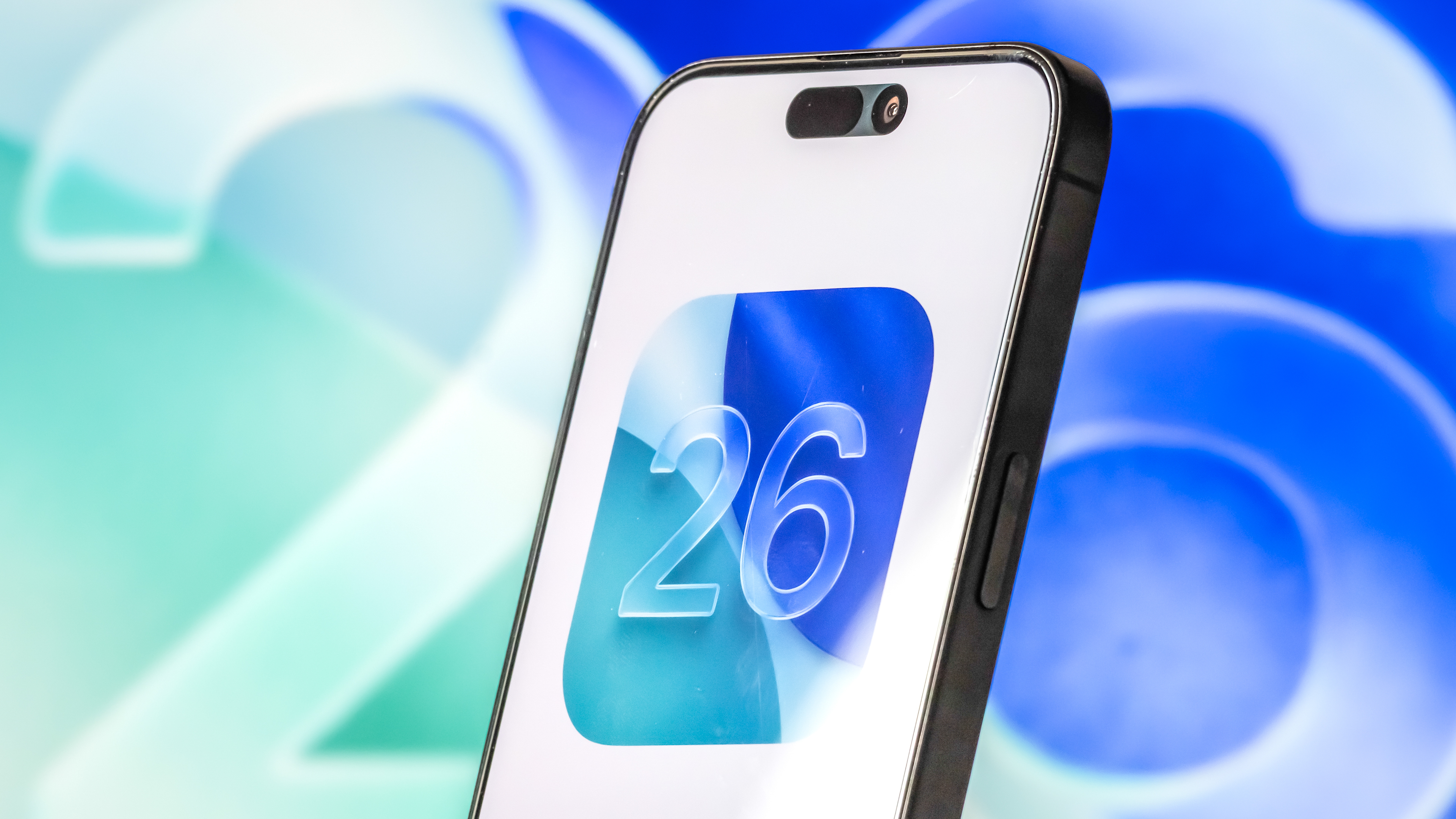Tom's Guide Verdict
The Zwift Ride makes indoor cycling on Zwift more accessible and enjoyable, and it’s significantly cheaper than other smart bikes. If you’re a keen Zwift user, or aspire to be, it’s the best exercise bike to get, but if you want to use other apps then there are better alternatives.
Pros
- +
Smooth and quiet ride
- +
Very easy to set up and use
- +
Works well with Zwift
Cons
- -
Limited compatibility with other apps
- -
Tablet holder costs extra
Why you can trust Tom's Guide
Height: 43.3in (max handlebar height)
Width: 23in
Length: 53.5in
Weight: 78lbs
Frame: Steel
Resistance: Electromagnetic
Gears: 24
Power range: 0-1800w
Cranks: 170mm
Rider size: 5’ to 6’6”
Max rider weight: 265lbs
Connectivity: ANT+/Bluetooth
The Zwift Ride is one of the best exercise bikes available, and offers much better value than rival smart bikes, which will generally set you back more than twice as much. It’s the easiest and most enjoyable way to ride on Zwift, and the bike I’d buy if I was starting afresh with my indoor cycling setup.
There are downsides, however, one of which is the lack of full compatibility with other training apps, and if you have a bike you can use at home then buying the one of the best indoor cycling trainers to use with it will be a cheaper way to use Zwift and other apps.
The accessibility of the Zwift Ride does make it especially attractive to more casual cyclists, however, and it also offers enough to experienced riders to make it a top option for indoor training for them as well. It is purpose-built to get people riding on Zwift though, so if you’re looking for a bike to use with instructor-led classes, something like the Peloton Bike would be a better option.
Zwift Ride review: Price and availability
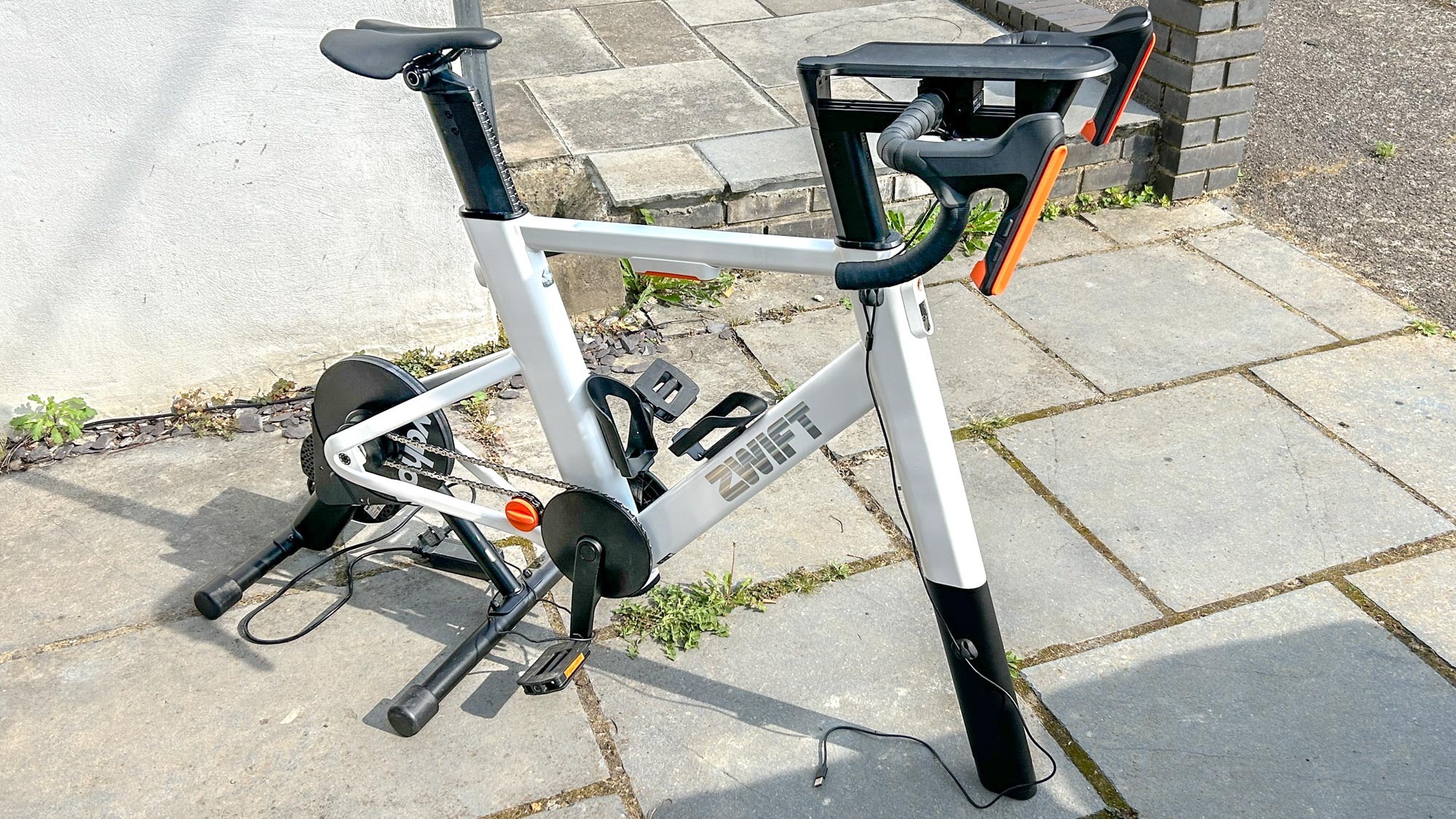
The Zwift Ride launched on June 26th and currently is only available in a package where you get the Zwift bike frame with a Wahoo KICKR CORE turbo trainer. This package costs $1,299.99 / £1,199.99 plus $75 / £65 shipping.
Later this year the Zwift bike frame will be available to buy by itself to attach to other compatible indoor cycling trainers like the Zwift Hub and Wahoo KICKR. To work with the frame a trainer needs to be compatible with the Zwift Cog attachment, which connects the bike frame to the trainer. Zwift says it is working with turbo trainer companies to make compatible products.
Although you can use the bike without an app, to get the most from Zwift Ride, you need to link it up to Zwift, which costs $19.99 / £17.99 a month or $199.99 / £179.99 a year. Other apps can connect to the Wahoo KICKR CORE, but you can’t shift gears in them using the Zwift bike frame.
Zwift Ride review: Design and setup
The Zwift Ride comes in three boxes, which makes it easier and cheaper to ship, and also to move around the house before unpacking it. Accessibility is a big feature of the bike, and a major part of this is how easy it is to set up, especially compared to attaching a bike to a turbo trainer.
Get instant access to breaking news, the hottest reviews, great deals and helpful tips.
I managed to get the bike assembled by myself in around 20 minutes, and I expect most people are more competent than me and would get it done in 15, or under 10 if you are experienced with bikes and have set up an indoor trainer before.
The Zwift Cog is key to this easy setup, because it allows you to just drop the bike onto the KICKR CORE trainer, whereas when setting up my road bike with a turbo trainer in the past I had to enlist a friend to help me work out what the right cassette was.
There are detailed instructions in the boxes, and the only tool required to set up and adjust the bike is a hex wrench attached to the underside of the top bar on the frame. You can move the seat and handlebars up and down and forward and back, with a size chart included that gives you the rough positions that are likely to work best for your height – the bike can accommodate riders from 5’-6’.6’’.
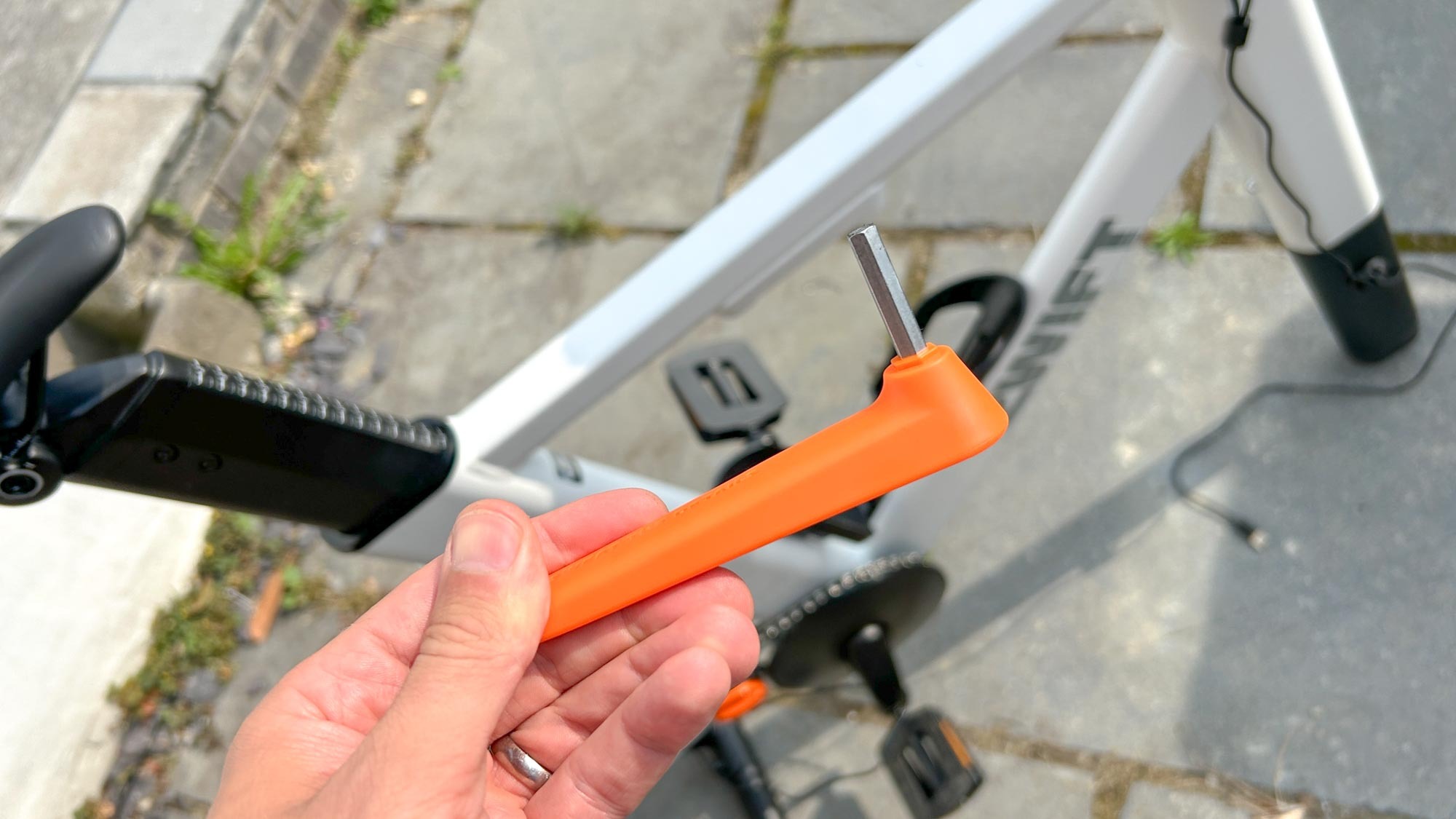
The Zwift Ride differs from other smart bikes in that it is a frame attached to a trainer, much like attaching a bike to a trainer, whereas rivals like the Wattbike Atom or Wahoo KICKR Bike come as one complete unit. Once riding the bike, however, it feels like a complete unit in the same way as other smart bikes.
On the handlebars is a tray that you can put your phone and other in-ride essentials on, like energy gels or other nutrition. There are two bottle holders on the bike frame, which are more open than ones you’d use on an outdoor bike, so you can get bottles in and out more easily.
The Zwift Ride doesn’t have a built-in screen like the Peloton Bike, and doesn’t have a tablet holder as standard either. You can buy a tablet holder ($49.99 / £39.99) that hooks onto the end of this tray, which would be a useful addition if you run Zwift on a tablet rather than a laptop or other device.
On the handlebars are buttons that you can use to control Zwift, and also to shift gears when riding in the Zwift app (as of now, you can’t shift gears when using other apps). The handlebars are battery powered and last 20 hours on a charge.
While I used the Zwift Ride in my garage, it’s a good-looking bit of kit and easy to keep clean compared to using your outdoor bike on a trainer, so it’s a machine that you can use inside your apartment or house.
Zwift Ride review: Zwift app
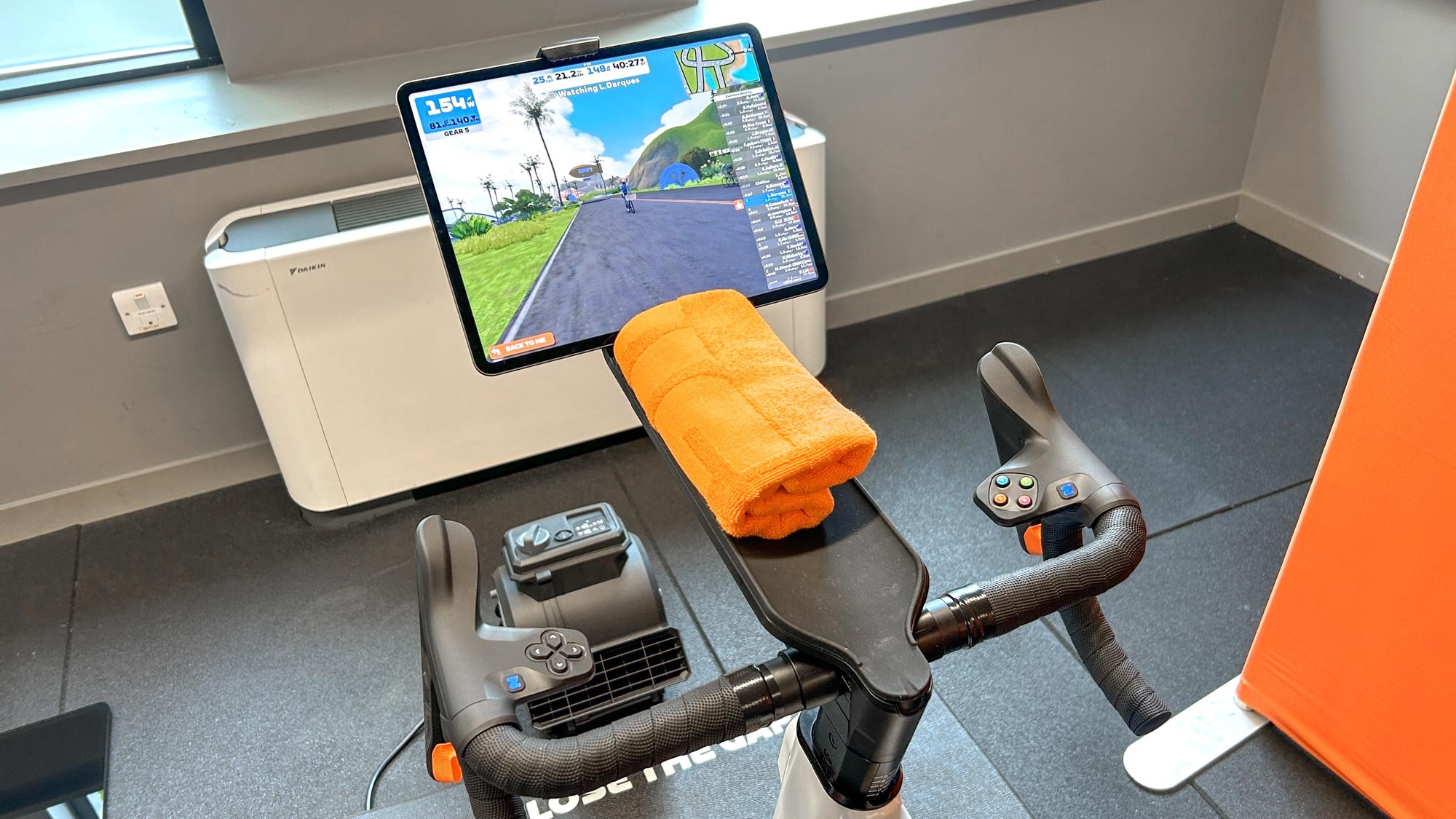
The Zwift Ride is the easiest way to get into cycling with Zwift, and removes a barrier to entry for the app, which was the relative difficulty of having to setup a turbo trainer with a bike or the very high cost of a smart bike like the Wattbike Atom.
I have been using Zwift for many years and I consider it the most enjoyable way to ride indoors, with the colorful and interesting virtual worlds you can cycle around in the app being very engaging. While in your garage you can cycle up mountains, through deserts and under skyscrapers, and take on real world routes in places like London, France or a futuristic version of New York. Brave riders can also take on epic climbs like the Alpe du Zwift and Zwift Ventoux, which are modeled on the iconic Alp d'Huez climb and Mont Ventoux climbs in France.
You can also ride with others in group rides or races, and link up easily with friends. There are a lot of preset workouts you can tackle in the app, along with full training plans, and you can build your own workouts too. There aren’t live classes with an instructor to follow as with a Peloton or Echelon bike, though you could watch and follow these on a different app, as long as you’re also logged into Zwift so you can change gears to adjust the resistance.
Whether you’re a casual cyclist or someone who lives to ride, Zwift has a lot to offer. I mainly use indoor cycling as a way to cross train and support my primary sport of running, and Zwift makes it a lot more fun.
Zwift Ride review: Performance
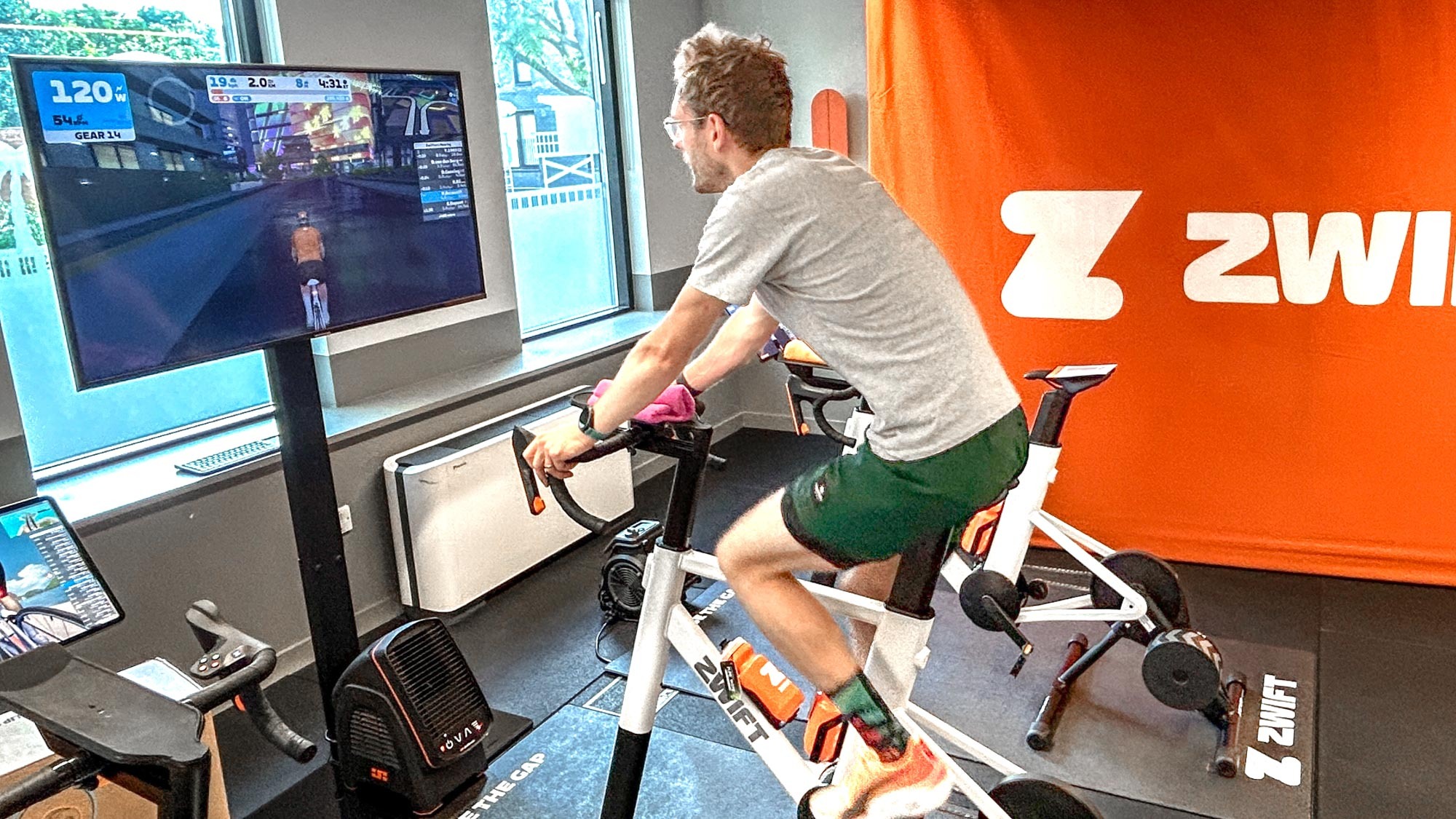
I’ve been using the Zwift Ride regularly over the past few weeks, mainly for fairly short rides of 30-45 minutes in the evenings, plus one longer ride including more climbing. The bike is very quick to link up with the Zwift app on an iPad or Apple TV, and I’ve not experienced any connectivity dropouts during rides.
The ride is smooth and very quiet — if you use a fan to keep you cool during workouts, which I highly recommend doing, you barely hear the bike itself. Shifting gears using the handlebar controls and Zwift Cog is seamless and quiet as well, and the KICKR CORE responds quickly to changes in the gradient when riding routes on Zwift to automatically adjust for climbs and descents.
It creates an enjoyably realistic ride experience indoors, which is then made more enjoyable by watching your avatar ride around Zwift’s virtual worlds and the volcanoes, dinosaurs and other such things they contain.
You can also steer in Zwift using the handlebars, by pulling the paddles on each handlebar. This allows you to veer around the road in Zwift, which can be used to take a more advantageous line in races, or play a mini game called Repack Rush where you veer around the road to pick up boosts and avoid obstacles.
I’ve used Zwift with various other indoor cycling options, including the Wattbike Atom and Wahoo KICKR smart bikes and my old turbo trainer, and the experience on the Zwift Ride isn’t that different aside from the upgrade of the controls on the handlebars and the easy setup you get with the Zwift frame. It’s smoother and quieter than using my turbo trainer though, and considerably cheaper than the other smart bikes I’ve used.
Zwift Ride review: Connectivity with other apps
One big drawback to the Zwift Ride for now is that while the KICKR CORE turbo trainer will link up easily with any app, the Zwift handlebars won’t. This means you can’t virtually shift gear in an app like TrainerRoad or Rouvy.
You can still use these apps and with ERG mode they will control the resistance on the turbo trainer, so you can do structured workouts — I tried one in Rouvy with no problems. However, if you want to ride in simulation mode in an app like Rouvy then you are stuck in one gear. Hopefully this is something that will be changed in the future.
The only other minor connectivity problem I had was with Apple TV, which only supports two Bluetooth connections. The KICKR CORE and Zwift handlebars use these up, so I couldn’t also connect my heart rate monitor to the Apple TV (you can try and do this via the Zwift Companion app, but dropouts are common). I mostly use an iPad for Zwift and could connect all three devices without problems, but it’s something to bear in mind if you want to use an Apple TV with the Zwift Ride.
Should you buy the Zwift Ride?
If I was starting from scratch with indoor cycling, I’d buy the Zwift Ride. It’s much cheaper than other smart bikes, very easy to set up and use, and offers a quiet and smooth ride. It’s also more convenient to have a bike frame attached to a turbo trainer like this, rather than using your own bike with a turbo trainer, and it’s easier to maintain the Zwift Ride as well.
More expensive smart bikes like the Wattbike Atom and Wahoo KICKR offer more customization and bigger power ranges with (slightly) more precise power measurements, but they cost a lot more and would only be worth the upgrade for very serious cyclists.
If you already have a bike at home then buying a turbo trainer to use with it will be a cheaper option than investing in a purpose-built training bike frame like Zwift Ride, but after years of riding on such a setup myself I certainly prefer using Zwift Ride.

Nick Harris-Fry is an experienced health and fitness journalist, writing professionally since 2012. He spent nine years working on the Coach magazine and website before moving to the fitness team at Tom’s Guide in 2024. Nick is a keen runner and also the founder of YouTube channel The Run Testers, which specialises in reviewing running shoes, watches, headphones and other gear.
Nick ran his first marathon in 2016 and became obsessed with the sport. He now has PBs of 2hr 25min for the marathon and 15min 30sec for 5K. Nick is also a qualified Run Leader in the UK.
Nick is an established expert in the fitness area and along with writing for many publications, including Live Science, Expert Reviews, Wareable, Coach and Get Sweat Go, he has been quoted on The Guardian and The Independent.
